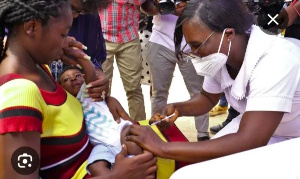Health News of Sunday, 28 April 2024
Source: GNA
Ghana to observe vaccination, immunization weeks from May 4-9
Ghana is to observe this year’s African Vaccination and World Immunization Week from May 4 to 9, 2024.
The African Vaccination Week is an annual event celebrated during the last week of April in synch with the other World Health Organisation (WHO) regions and the World Immunization Week (WIW).
It is led and coordinated by the WHO Regional Office for Africa with the aim to strengthening immunisation programmes by increasing awareness of the importance of every person’s need and right to be protected from vaccine-preventable diseases, particularly for children and women.
The WIW is an international health event usually observed from April 24 to 30. Its goal is to increase vaccination rates and shield people of all ages against infectious illnesses.
The worldwide immunisation campaigns during the second half of the 20th century are among humanity’s greatest achievements, defeating polio, eradicating smallpox and guaranteeing that more children survive and thrive.
In 2024, the Expanded Programme on Immunisation (EPI) of the WHO will commemorate its 50th anniversary on theme: “Safeguarding Our Future: Humanly Possible.”
Dr Naziru Tanko, Deputy Programme Manager, Expanded Programme on Immunisation (EPI), during a media engagement on the uptake of vaccines in Accra, noted that a new WHO report says an estimated 51.2 million lives have been saved through vaccines in the African region over the past 50 years.
“For every infant life saved over that period, close to 60 years of life are lived” he said.
“These achievements have been possible under the Expanded Programme on Immunization (EPI), a WHO initiative launched in 1974 as a global endeavour to ensure equitable access to life-saving vaccines for every child, regardless of their geographic location or socioeconomic status.”
The report, which assesses the life-saving impact of vaccines, was released Wednesday at the start of this year’s African Vaccination Week and World ImmunizationWeek. With the continuous support from the WHO, UNICEF and Gavi ( the Vaccine Alliance), a public–private global health partnership with the goal of increasing access to immunisation in poor countries, most countries in the region provide antigens for 13 vaccine-preventable diseases, up from the initial six when the EPI was introduced.
The report indicates notable achievements, including reduction in measles deaths, with an estimated 19.5 million deaths averted over the last 22 years.
The region has also witnessed a sharp decline in meningitis deaths by up to 39 per cent in 2019 compared with 2000.
Maternal and neonatal tetanus has nearly been eliminated in the region, and in a historic public health achievement, the African region was declared free of indigenous wild poliovirus in 2022 following years of relentless work to protect every child from the virus.
Entertainment










